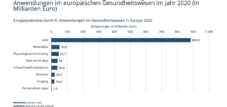Development of the market for artificial intelligence in Japan: favorites, research, support, applications and future plans
Xpert pre-release
Language selection 📢
Published on: May 9, 2025 / update from: May 9, 2025 - Author: Konrad Wolfenstein

Development of the market for artificial intelligence in Japan: favorites, research, support, applications and future plans - Image: Xpert.digital
How Japan leads to AI research: Market analysis 2023-2034
From regulation to innovation: what shapes the Japanese AI market
The Japanese market for artificial intelligence (AI) is experiencing significant growth and is becoming increasingly important in the global AI landscape. Current estimates indicate a considerable market size in 2023 and 2024, with promising growth forecasts for the coming decade. Leading companies, both internationally and from Japan itself, are increasingly investing in research and development, doing technological progress and developing new areas of application. While the market is developing dynamically, successful AI implementations are already emerging in various industries, including the healthcare system, the automotive industry, the financial sector and retail. The Japanese government plays a crucial role in promoting this growth through strategic initiatives and investments in AI research and development. Despite the positive view, the Japanese AI market also faces challenges, especially with regard to the shortage of skilled workers and ethical and regulatory concerns. A comparison with other leading industrialized countries shows Japan's strengths and weaknesses, while cultural and economic factors significantly influence the speed and type of AI adaptation in the country. In the future, the Japanese AI market will offer considerable opportunities for companies and investors, but requires a deep understanding of the specific market conditions and challenges.
Suitable for:
Japan's market for artificial intelligence: current situation and growth forecast
The market for artificial intelligence in Japan shows a remarkable dynamic, whereby different sources deliver different, but overall positive assessments of the current market size. In 2023, the turnover of the Japanese AI market was estimated at $ 9,962.4 million. For 2024, different values are mentioned, which reflect the variety of market definitions and segmentations. In 2024, the market for consumer AI in Japan is estimated at $ 1.87 billion, while another source estimates the entire Japanese AI market in the same year to $ 6.6 billion and another to $ 7.56 billion. A study from 2022 evaluated the market at $ 3.89 billion. If you look at specific segments, the KI market in the retail industry reached a value of $ 460.71 million in 2023, and the market for AI training data records was estimated at $ 132.04 million in the same year. The generative AI market will be estimated for $ 1,349.0 million for 2024. The fluctuations in these figures clarify that the AI market in Japan is still in an early development phase and that the exact demarcation and evaluation is a challenge. It is crucial to take into account the respective focus of the studies (e.g. consumer AI, retail AI, generative AI) in order to correctly interpret the numbers.
The growth forecasts for the Japanese AI market are consistently optimistic and indicate significant expansion potential. An average annual growth rate (CAGR) of 43.7 % from 2024 to 2030 is expected for the entire AI market, which corresponds to a forecast sales of $ 125,891.6 million in 2030. Other studies confirm this trend, albeit with slightly different numbers. For example, a CAGR of 23.4 % is forecast from 2025 to 2030, with a target volume of $ 7.18 billion in 2030. The market for AI in marketing is expected to grow by 28.3 % annually and reach $ 3,876.3 million. Another forecast provides for a CAGR of 21.43 % from 2022 to 2032 for the entire AI market, which corresponds to a volume of $ 27.12 billion in 2032. The retail AI market is expected to increase with a CAGR from 31.66 % from 2024 to 2032 to $ 5,480.14 million, and the market for AI training records is expected to grow to $ 1,023.28 million annually from 2024 to 2032. A CAGR of 23.30 % is expected for the entire AI market from 2024 to 2030, which is expected to achieve a volume of $ 26.80 billion. The market for generative AI is even forecast with a CAGR from 38.8 % from 2024 to 2033 to $ 25,796.2 million. These matching forecasts underline the considerable growth potential of the AI market in Japan across various sectors.
Several factors contribute to this dynamic growth. Increasing investments in AI integration both in public and private sector are an essential growth driver. The integration of AI with 5G technology improves connectivity and enables real-time applications in various consumer areas. In addition, increasing investments in research and development by leading companies play a crucial role in the spread of AI technologies. Advances in data analysis as well as the growing availability of big data and powerful computer resources also fuel market growth. In retail, the increasing introduction of AI technologies to improve customer experience and to optimize retail processes is mentioned as an important factor. Cross -sectors are driving the increasing need for automation and improved models of machine learning ahead with demand for AI. The Japanese government has also been committed to promoting innovation and research in the AI sector and provided considerable resources. The broad application of AI in various industries such as smart cities, healthcare, production, finance, entertainment and transportation contributes significantly to market growth.

Japan's market for artificial intelligence: current situation and growth forecast - Image: Xpert.digital
The market analyzes of various report sources show strong growth forecasts for the AI sector. According to Next Move Strategy Consulting, the consumer AI market will grow from $ 1,870 million to USD 7,180 million in 2030, with a CAGR of 23.4 %. Grandview Research forecasts growth of $ 9,962.4 million in 2023 to $ 125,891.6 million in 2030, with a CAGR of 43.7 %. The "AI in Marketing" area is to grow from USD 679.0 million to USD 3876.3 million (2030) with a CAGR of 28.3 %. Spherical Insights expects an increase of $ 3,890 million to the global AI market in 2022 to $ 27,120 million in 2032 at a CAGR of 21.43 %. The Imarc Group sees an increase in the market of $ 6,600 million in 2024 to $ 35,200 million by 2033 with a CAGR of 20.4 %. For "AI in retail", Credence Research forecasts growth of $ 460.71 million in 2023 to $ 5,480.14 million in 2032, with a CAGR of 31.66 %, while "AI training data sets" from USD 132.04 million to USD 1,023.28 million (2032) CAGR of 25.5 % should grow. For the global AI market, Techsci Research forecasts an increase of $ 7,560 million in 2024 to $ 26,800 million by 2030 at a CAGR of 23.30 %. Dimension Market Research sees growth from USD 1,349.0 million (2024) to $ 25,796.2 million (2033) with a CAGR of 38.8 %.
Leading companies and their technological progress in the Japanese AI market
The Japanese AI market is characterized by a mixture of global technological and established Japanese companies as well as emerging AI startups. The important actors in the field of consumer AI include Openai, Microsoft Corporation, Amazon.com, Inc., Alphabet Inc., Meta Platforms, Inc., International Business Machines Corporation, Nvidia Corporation, Oracle Corporation, Midjourney, Inc. and Anthropic, Inc. Companies such as NEC, MONEYTREE, Softbank Robotics, Tier 4, Abeja, ISPACE, Preferred Networks, Mynd Corporation, Poznan, Cogent Labs, Mujin, Autify, Tental, Comte, Deepcore, Leapmind, Babel, Inc., Cinnamon, Ubie, Tripla, KK and Heartcore Enterprises active. Global players such as Advanced Micro Devices, Aicure, Arm Holdings, Baidu, Alphabet, IBM, Intel, Microsoft and Nvidia also play an important role. In the field of AI in retail, infosys, TCS, Google LLC, IBM Corporation, Accenture, Nvidia, Salesforce and Microsoft Corporation dominate. The market for AI training data records is listed by Preferred Networks, Fujitsu and Sony Corporation, together with global actors such as Alphabet Inc Class A, Appen LTD, Cogito Tech, Com Inc. and Microsoft Corp. This variety of companies, from established corporations to innovative startups, is driving the development and use of AI in Japan.
The analysis of the market shares shows that software solutions in the area of consumer AI take a dominant position and make up over 50 % of the market share. This underlines the broad acceptance and integration of AI-supported software solutions in various consumer applications. In the area of the generative AI, software also leads with a market share of 64.3 % in 2024. In 2022, the BFSI segment (banks, financial services and insurance services) dominated the entire AI market with a market share of 31.3 %. However, comprehensive market share data for all leading companies are not consistently available, which reflects the dynamics of the market and the different focus of the studies.
The technological progress of leading companies is diverse and affect different areas of application. Sony invests in AI for applications in the areas of entertainment, robotics and healthcare. Panasonic is also heavily involved in AI research, development and application. Fujitsu focuses on AI solutions for corporate applications and cloud computing. Kudan Inc. is known for his advanced Lidar Slam technology, which was recently integrated into Terra Drone Corporation's Terra Lidar Dual. Terra Drone Corporation, a leading Japanese provider of drone solutions, uses Kudan's Slam technology for more precise aerial photo mapping and measurement. OM1 has launched innovative products such as OM1 Orion, OM1 Lyra and OM1 Polaris that use Phenoma, a AI-based digital phenotyping platform for personalized medicine and clinical research. In health care, AI-based diagnostic procedures are used in hospitals in Tokyo, which can predict treatment results with over 70 %accuracy. In the automotive industry, KI plays a crucial role in the development of autonomous driving technologies that reduced the number of traffic accidents by 30 % last year. Softbank and Fujitsu are working together on the commercialization of AI-Ran, an innovative architecture that integrates AI into radio access networks (RAN), with the aim of introducing the introduction by 2026. Fujitsu develops various AI-ran models, including AI for RAN, AI on RAN and AI and RAN to improve the performance and efficiency of radio access. Softbank Robotics has developed the humanoid robot Pepper, which has conversational AI and is used in various areas such as retail, healthcare and hospitals. Astellas Pharma uses a KI and robotics platform called Mahol-A-BA to accelerate medication development. Google has introduced progressive AI tools for dealers to improve brand and product marketing. Alphabet Inc. (Google) has introduced Project Astra, a new multimodal AI agent that can edit real-time inquiries in different formats. Japan has a long history of investments in robotics and automation. Companies such as Fanuc and Softbank Robotics develop AI-based robots for the manufacturing, health and service industry. NEC and Toshiba develop AI applications for the early detection of diseases and personalized treatment plans in the healthcare system. The automotive industry in Japan, with giants such as Toyota and Honda, invests heavily in AI innovations for autonomous vehicles and advanced driver assistance systems (ADAS), which are tested in smart cities such as Toyotas Woven City. Sakana AI has established itself as a unicorn in the field of processing of natural language (NLP) and expanded into different languages and industries.
🎯📊 Integration of an independent and cross-data source-wide AI platform 🤖🌐 for all company matters

Integration of an independent and cross-data source-wide AI platform for all company matters-Image: Xpert.digital
Ki-Gamechanger: The most flexible AI platform-tailor-made solutions that reduce costs, improve their decisions and increase efficiency
Independent AI platform: Integrates all relevant company data sources
- This AI platform interacts with all specific data sources
- From SAP, Microsoft, Jira, Confluence, Salesforce, Zoom, Dropbox and many other data management systems
- Fast AI integration: tailor-made AI solutions for companies in hours or days instead of months
- Flexible infrastructure: cloud-based or hosting in your own data center (Germany, Europe, free choice of location)
- Highest data security: Use in law firms is the safe evidence
- Use across a wide variety of company data sources
- Choice of your own or various AI models (DE, EU, USA, CN)
Challenges that our AI platform solves
- A lack of accuracy of conventional AI solutions
- Data protection and secure management of sensitive data
- High costs and complexity of individual AI development
- Lack of qualified AI
- Integration of AI into existing IT systems
More about it here:
Progress with influence: Japan's AI potential in smart cities and industry
Identification of potential favorites on the Japanese AI market
The identification of potential favorites on the Japanese AI market requires a consideration of various factors such as innovative strength, investments, strategic partnerships and market focus. Based on the available information, some companies can be highlighted. Softbank Robotics could be a favorite, especially if interest is directed towards robotics and comprehensive AI services. Her humanoid robots like Pepper have already found broad use. Tier 4 is a potential leader in the area of open source technology for autonomous driving. Leapmind could be an interesting option for companies that concentrate on EDGE-KI and energy-efficient AI solutions. Preferred Networks, Fujitsu and Sony Corporation play an important role in the field of AI training data records and are therefore decisive actors in the basic development of AI. Global technology companies such as Openai, Microsoft, Amazon and Alphabet have the resources and expertise to assert and expand their market leadership in various AI segments. The fact that large Japanese companies such as Softbank and Toyota actively search for external partners to achieve their AI goals indicate that these corporations will also play a significant role in promoting AI adaptation in Japan. Sakana Ai, as an up -and -coming unicorn in the NLP area, also has considerable growth potential in the area of generative AI.
The strength of Softbank Robotics lies in the combination of robotics and AI, which is a clear advantage in the face of Japan's traditional strength in robotics. The open source approach of Tier 4 in the area of autonomous driving could enable broader acceptance and faster innovation in this important future field. Leapmind's focus on Edge-KI addresses the growing demand for AI processing directly on devices, which is crucial for many applications in areas such as IoT and embedded systems. The participation of Preferred Networks, Fujitsu and Sony in AI training data positions them strategically in the heart of AI development, since high-quality data is essential for the training of effective AI models. The global giants bring their extensive research and development capacities as well as their established cloud infrastructures into the Japanese market. Softbank and Toyota's willingness to cooperate shows that they consider AI as a strategic need for their future competitiveness and are willing to work with innovative partners. Sakana Ai's success as a unicorn in the NLP area indicates a strong technological basis and a promising market potential in the field of language processing and generative AI.
Suitable for:
- Integration of AI and machine learning in warehouse logistics - global developments in Germany, EU, USA and Japan
Successful applications of artificial intelligence in various industries in Japan
AI is already successfully used in a variety of industries in Japan. In healthcare, AI improves diagnostics, for example through the analysis of medical imaging for the early detection of diseases such as cancer. In hospitals in Tokyo, AI-based diagnostic procedures are used, which predict treatment results with high accuracy. Companies such as NEC and Toshiba develop AI applications for the early detection of diseases, patient monitoring and personalized treatment plans. In view of the aging population of Japan, the use of AI in the healthcare system is particularly relevant to improve patient care, optimize processes and support medical research. Astellas Pharma uses AI and robotics to accelerate medication development, and Eisai uses Ki to identify promising active ingredients against diseases such as Alzheimer's and cancer.
In the automotive industry, KI plays a central role in the development of autonomous vehicles and advanced driver assistance systems (ADAS). These technologies are tested in smart cities such as Toyotas Woven City. AI-supported advances in the field of autonomous vehicles are fundamentally changing the industry. The introduction of autonomous driving technologies led to a reduction in traffic accidents by 30 % last year. Scale AI is working with Japanese automobile manufacturers on the development of special training data sets for autonomous vehicles.
In the financial sector, AI finds a quick acceptance in the Kanto region. It is used to detect fraud, risk management, customer care through chatbots and for algorithmic trade. Japanese banks use AI algorithms to analyze large amounts of financial data to improve investment decisions and increase productivity. FinTech companies also use AI to develop innovative financial services.
In retail, AI is used to obtain customer information. The use of AI-based chatbots for customer service, visual recognition systems for seamless shopping experiences and predictive analyzes for demand forecast increases. AI-supported cameras are used to monitor customer transport and to optimize shop layouts. Retailers use AI for personalized marketing, inventory management and predictive analyzes to optimize the supply chains. Automated cash register systems and robotics change the traditional retail environment. The media and entertainment sector holds the largest part in the Japanese consumer AI market, which indicates considerable investments in AI technologies.
AI is also used successfully in other industries. In production, AI contributes to automation, forward -looking maintenance and quality control and promotes the development of intelligent factories. In agriculture, processes such as plants, harvesting and monitoring plant health are automated. AI-based data analyzes are used to reduce waste in food processing and improve resource allocation. In the area of transport and logistics, KI helps to improve security in public transport, to reduce traffic jams and to optimize traffic management. Autonomous vehicles and drones are integrated into logistics processes in order to make delivery services more efficient.
Future plans and strategies of the Japanese government and important industrial actors regarding the further development and implementation of artificial intelligence
The Japanese government recognizes the potential of AI to increase economic growth and improve global competitiveness and has provided considerable resources for the promotion of innovation and research in this sector. The government's AI strategy, which is presented in various political documents such as the “AI strategy 2019” and subsequent updates, emphasizes the importance of AI for achieving the digital transformation goals of Japan. An important factor is state financing and investment in AI research and development (F&E). Public funds flow into basic research as well as in applied AI projects and promote cooperation between universities, industry and government institutions. The Japan Science and Technology Agency (JST) and the New Energy and Industrial Technology Development Organization (Nedo) play a central role in supporting Ki-F & E-initiatives. In addition, the government focuses on building a solid pool of AI talents through educational programs and training initiatives. The Ministry of Economics, Trade and Industry (METI) has launched the Geniac project, which aims to use generative AI for economic growth and social progress. In Hiroshima, the OECD has launched a pilot project to monitor the Hiroshima process of international behavioral code for AI developers, which underlines the commitment of ethical AI development.
Important industrial actors also pursue ambitious plans and strategies in the field of AI. In April 2024, Microsoft announced an investment of $ 2.9 billion in Japan, which focuses on expanding the AI and Cloud infrastructure. Oracle Corporation has expanded and announced its cloud computing and AI infrastructure in Japan to invest around $ 8 billion in the next ten years in order to serve the growing demand for advanced technology infrastructure. Softbank and Fujitsu work together on the commercialization of AI-Ran, with the aim of the introduction by 2026. This partnership focuses on F&E, the development of VRAN software and the AI-based optimization of mobile networks. Fujitsu develops various AI-RAN models to transform the performance of radio access networks by AI. Softbank Robotics will continue to develop service robots with advanced AI skills. Many important actors will enter into strategic cooperation and acquisitions to expand their range of data records. Various Japanese companies such as Softbank and Toyota are actively looking for external partners to reach their AI goals.
Future priorities for AI development and implementation in Japan include a wide range of applications. These include smart cities, generative AI, Edge Computing, AI-based automation in various industries, AI for sustainability, AI in finance (FinTech), AI in Marketing, AI for Training Data Sentences, Ai-Ran, AI in Creating, AI for Personalized Medicine, AI for improved safety, AI for improvement, AI for improving the Customer experience, AI for forward -looking maintenance, AI for environmental protection initiatives, AI for geriatric care, AI for drug development, AI for increasing agricultural efficiency, AI for the optimization of logistics, AI for improving public transport, AI for risk management and compliance, KI for conversational interfaces, AI for talent management and AI Acceleration of research and development. These diverse areas of application illustrate the broad spectrum of future AI development in Japan.
🎯🎯🎯 Benefit from Xpert.Digital's extensive, fivefold expertise in a comprehensive service package | R&D, XR, PR & SEM

AI & XR 3D Rendering Machine: Fivefold expertise from Xpert.Digital in a comprehensive service package, R&D XR, PR & SEM - Image: Xpert.Digital
Xpert.Digital has in-depth knowledge of various industries. This allows us to develop tailor-made strategies that are tailored precisely to the requirements and challenges of your specific market segment. By continually analyzing market trends and following industry developments, we can act with foresight and offer innovative solutions. Through the combination of experience and knowledge, we generate added value and give our customers a decisive competitive advantage.
More about it here:
AI in Japan: growth potential and cultural borders
Analysis of the expected trends and challenges of the Japanese AI market in the coming years
The Japanese AI market will be shaped by several important trends in the coming years. This includes the increased introduction of AI in healthcare for diagnostics, treatment planning, patient monitoring and the management of electronic health records, driven by the aging population and the need for efficient health services. Another trend is the expansion of AI in production and in Industry 4.0 for automation, forward -looking maintenance and quality control, which contributes to the development of intelligent factories. In the financial services sector, too, AI is increasingly used for fraud recognition, risk management, customer service through chatbots and algorithmic trade. The increasing demand for personalized shopping experiences in retail also drives the introduction of AI technologies. Sustainability is becoming an important trend in Japanese retail, with AI playing a crucial role in promoting environmentally friendly practices. The transition to synthetic and augmented data will also be an important trend on the market for AI training data records. The increasing distribution of edge-based AI applications in areas such as smart cities and autonomous vehicles will expand the market for relevant training data records. The Japanese media are increasingly emphasizing the economic advantages of AI, which contributes to an optimistic public perception.
Despite these positive trends, the Japanese AI market faces significant challenges. An important problem is the lack of specialists and the existing qualification gaps in the workforce. The demand for AI experts far exceeds the available supply of qualified specialists, which hinders the growth and development of the AI sector. Japan is in the global competition for AI talents. Ethical and regulatory concerns are also a challenge. Questions of data protection, data security and bias in AI algorithms as well as the lack of a clear regulatory framework hinder the development and acceptance of AI technologies. Compliance with strict data protection regulations and the protection of privacy are of great importance in Japan. The fear of the employees of possible job cuts by AI is also a challenge for the introduction. The high implementation costs of AI solutions can be a hurdle, especially for small and medium-sized companies (SMEs). The compatibility of AI solutions with outdated IT infrastructures, especially at SMEs, can also be a problem. Cultural factors such as risk units and consensus-controlled decision-making can slow down the speed of AI adaptation in Japanese companies. The language barrier can also be a challenge, since many AI models are mainly trained with English-language data.
The latest developments include the integration of Kudan Inc.'s Lidar Slam technology in Terra Drone Corporation's Terra Lidar Dual in June 2024. Google presented progressive AI tools for dealers in May 2024. In May 2024, OM1 launched three AM-based products (OM1 Orion, OM1 Lyra and OM1 Polaris) for personalized medicine and clinical research. Alphabet Inc. (Google) presented Project Astra in May 2024, a new multimodal AI agent. Softbank and Fujitsu work on the introduction of a AI-controlled RAN by 2026.
Comparison of the development of the AI market in Japan with development in other leading industrialized countries
The Japanese AI market shows strong growth, but compared to other leading industrialized countries there are some remarkable differences. In 2023, the value of the Japanese AI market was $ 6 billion, while the Chinese market reached $ 25.1 billion and the US market even $ 47.4 billion. The United States is expected to lead global market turnover in the AI area in 2030. Within the Asia-Pacific region, it is predicted that China will be a leader in terms of sales in 2030, while South Korea is considered the fastest growing regional market and is to achieve sales of $ 93,34.3 million by 2030. In 2023, 5.1 % of the global turnover in the AI market accounted for Japan.
Japan's strengths are located in areas such as electronics technology, the automotive industry, robotics, semiconductors and biotechnology. The country has a long tradition in precise engineering and automation. Japan is recognized globally as a leader in the area of robotics, and AI has significantly improved this sector. Japan's strengths in robotics could prove to be a competitive advantage in the area of AI-based robotics. Japan's focus on precision and strict ethical standards could also become a competitive advantage in areas such as healthcare and autonomous systems in which accuracy and public trust are decisive.
The weaknesses of Japan compared to the USA and China include slower digital transformation of many organizations, often due to a corporate culture that presents consensus and risk avoidance over agility. Japan ranks third worldwide in F&E editions, but only in 47th place in the entrepreneurial intentions, which indicates a hesitant attitude towards disruptive innovations. The availability of training data in Japanese is limited, which can make the development of Large Language Models (LLMS) more difficult. Japan is behind China in the area of advanced chip. While the United States is leading in high-quality AI research, China leads in the pure number of publications. The United States has an advantage in advanced semiconductor technology and cloud computing capacities, while China benefits from huge amounts of data. The USA leads to the top AI researcher, but China quickly caught up with strategic investments. The United States shows strength in the area of corporate AI, while China is characterized in consumer applications and surveillance technology. Some observers argue that Japan's inability to achieve radical breakthroughs in the computer area led to the fact that the United States could not overtake it in technological leadership, and that China could have similar challenges in generation of fundamental innovations in the field of AI. Others see Japan as a leader due to his high adoption rate of AI in companies.
Examination of specific cultural or economic factors that influence the development and acceptance of artificial intelligence in Japan
Several specific cultural and economic factors influence the development and acceptance of AI in Japan. In terms of culture, Japan's cautious approach in the introduction of AI is due to a general cultural standard: an aversion to failures and risks. Japanese companies often value stability instead of innovation, which leads to careful investments in disruptive technologies such as AI. The consensus-controlled decision-making in hierarchical structures can delay the approval of AI projects and hinder agile experiments. The system of lifelong employment can lead to employees KI as a threat to their job security, which can lead to resistance to automation and digital transformation initiatives. Japanese consumers have extremely high expectations of product quality and functionality. Traditional values influence the acceptance of new technologies, with harmony and consensus playing an important role in decision -making. There is a strong preference for mobile technologies and applications as well as a growing concern for data protection and security.
From an economic point of view, the shortage of skilled workers is an important factor that affects AI adaptation. Japan produces fewer stem graduates compared to other OECD countries, which limits the available talent pool for AI development and management. The existing workers often do not have the necessary AI knowledge to effectively manage and use AI tools. However, the need to remedy a shortage of labor and reduce labor costs is a clear incentive for the introduction of AI in Japanese companies. Many Japanese companies, especially SMEs, use outdated IT infrastructures that can be incompatible with modern AI solutions. SMEs make up a large part of the Japanese economy and often do not have the financial and technical resources to advance AI integrations. The Japanese government promotes AI adaptation through initiatives such as Society 5.0 and investments in AI research for areas such as autonomous vehicles, smart cities and healthcare. The aging population and increasing health costs in Japan also drive interest and investments in AI solutions that can improve patient care and optimize processes. The automation of processes by AI is regarded as a possible solution for the labor shortage in Japan, especially in manual and physical professions.
Suitable for:
- Parcel deliveries for e-commerce: 500 kilometers of conveyor belt for parcels in Japan - automation on the highway between Tokyo and Osaka
Cultural and technological factors in the Japanese AI race
The Japanese market for artificial intelligence is in a phase of dynamic growth, driven by state initiatives, technological advances and increasing acceptance in various industries. The forecast growth rates indicate considerable potential for the coming years. Leading companies from home and abroad are increasingly investing innovative applications in areas such as healthcare, automotive industry, financial sector and retail. While some companies are already considered potential favorites, future market leadership will depend on their ability to advance innovations, to enter into strategic partnerships and to address the specific needs of the Japanese market.
Despite the promising prospects, the Japanese AI market is also facing significant challenges. The shortage of skilled workers and the need to create ethical and regulatory framework are crucial aspects that need to be addressed to ensure sustainable growth. Cultural factors such as risk units and the preference for consensus can affect the speed of the AI adaptation. A comparison with other leading industrialized countries shows that Japan lags behind in some areas, especially with regard to the market size and the speed of digital transformation.
In summary, it can be said that the Japanese AI market is an attractive and growing environment, which, however, requires a deep understanding of the specific cultural, economic and technological conditions. Companies and investors who are willing to engage in these special features and address the existing challenges can benefit from the considerable opportunities that the Japanese AI market offers in the coming years. The strategic orientation of the Japanese government on AI and the innovative strength of domestic companies indicate that Japan will play an important role in the global AI landscape.
























